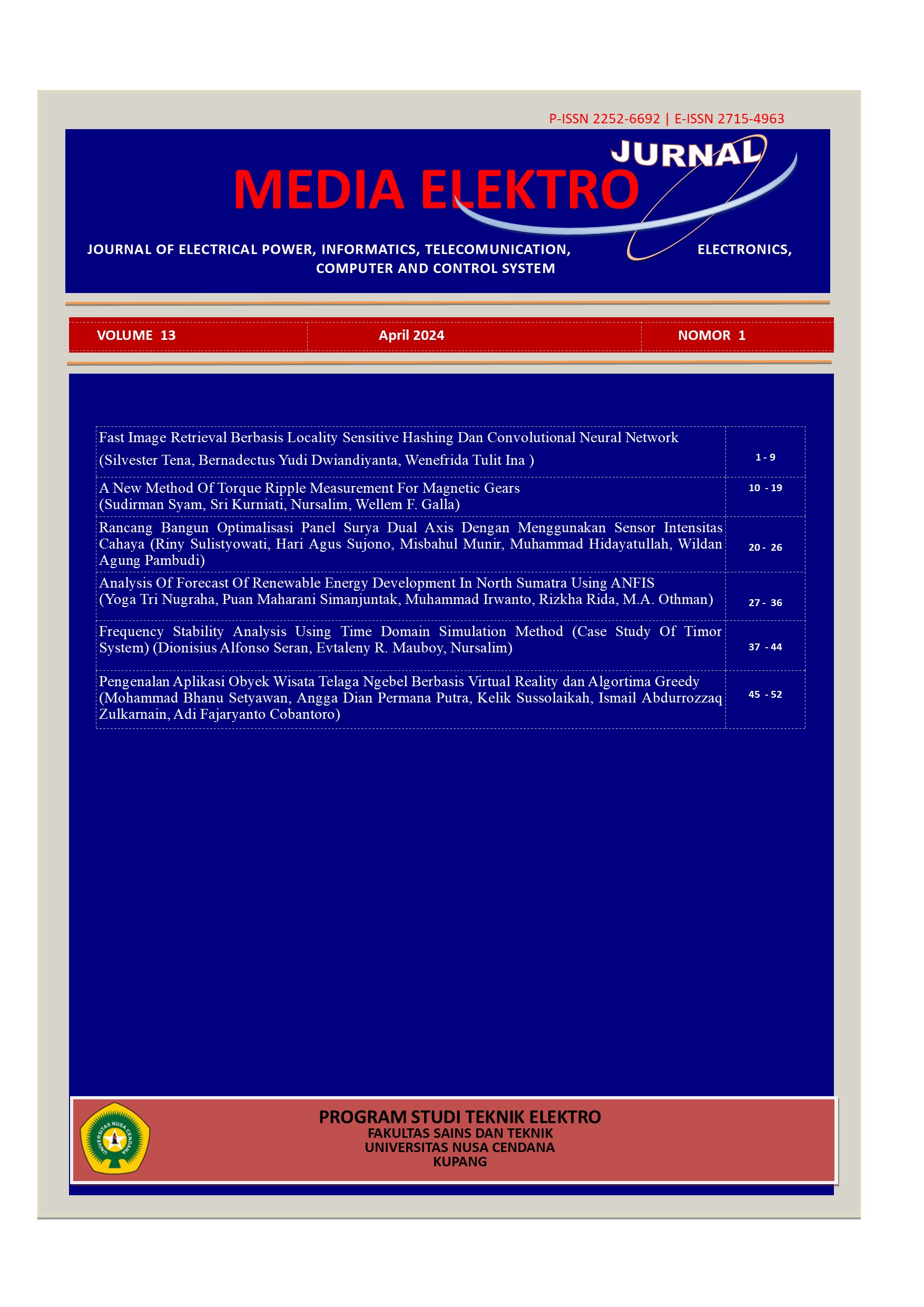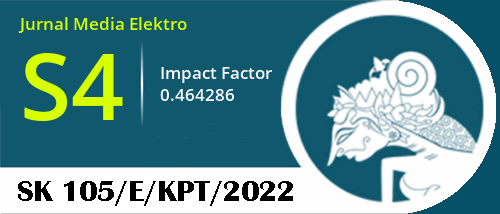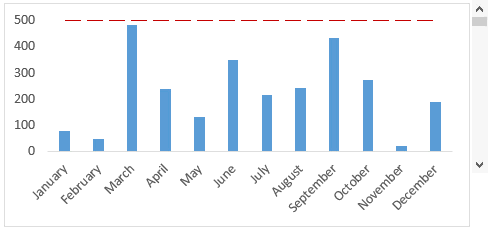FREQUENCY STABILITY ANALYSIS USING TIME DOMAIN SIMULATION METHOD (CASE STUDY OF TIMOR SYSTEM)
Abstract
Based on the 2021-2030 RUPTL, the addition of PLTU Timor 1 (2 × 50 MW) to the Timor system is carried out because electricity demand continues to increase. Therefore, a transient stability study is needed, to determine the reliability of the system when a disturbance occurs. By utilizing the Time Domain Simulation (TDS) method, the research was conducted by simulating generator outage and 3 phase short circuit to study the frequency stability of the Timor system. From the simulation results, generator outage has a major influence on system frequency stability, especially simulated at PLTU Timor 1 unit 1. The disturbance caused a decrease in the lowest frequency reaching 49.61 Hz so that it was not within the safe operating limits according to the operating guidelines for the Timor electricity system. For this reason, Manual Load Shedding (MLS) and the addition of generators at PLTD Cogindo and PLTMG Kupang Peaker are required. The action is carried out by paying attention to the rate of change of the next frequency. As for the 3 phase short circuit disturbance on one of the Bolok - Maulafa lines, the frequency increased to 50.06 Hz after the disturbance which is still within safe operating limits.
Downloads
References
PLN, “Rencana Usaha Penyediaan Tenaga Listrik (RUPTL) PT PLN (Persero) 2021-2030.,” 2021. https://web.pln.co.id/statics/uploads/2021/10/ruptl-2021-2030.pdf
H. Suyono, “Analisis Impak Injeksi Generator Baru Grati pada Stabilitas Transien Sistem Jawa – Madura – Bali (Jamali) 500kV,” ALINIER J. Artif. Intell. Appl., vol. 1, no. 2, pp. 69–78, 2020, doi: 10.36040/alinier.v1i2.2971.
A. A. Halik, “Kestabilan Transient Pada Sistem Kelistrikan Sulawesi Selatan,” Cyclotron, vol. 2, no. 1, pp. 1–5, 2019, doi: 10.30651/cl.v2i1.2509.
Prabha Kundur, “Power System Stability and Control - McGraw-Hill Education.” p. 1176, 1994.
M. Jamlaay, “Analisa Stabilitas Transien Sistem Tenaga Listrik Multi Mesin 11 Bus,” J. ELKO (ELEKTRIKAL dan KOMPUTER), vol. 3, no. 1, pp. 225–232, 2022. https://elko.polnam.ac.id/index.php/jurnalelko/article/view/57
P. Kundur et al., “Definition and classification of power system stability,” IEEE Trans. Power Syst., vol. 19, no. 3, pp. 1387–1401, 2004, doi: 10.1109/TPWRS.2004.825981.
R. M. Misbachudin, “Minimalisasi Pelepasan Beban Pada Pt. Fmc Agricultural Manufacturing Yang Disebabkan Gangguan Hubung Singkat Untuk Memperbaiki Stabilitas Transien Menggunakan Metode Sensitivitas Bus,” Media Elektr., vol. 13, no. 2, p. 54, 2020, doi: 10.26714/me.13.2.2020.54-66.
I. Rachmayanti, E. D., Pujiantara, M., & Robandi, “Studi Analisis Kestabilan Transien Dengan Metode Time Domain Simulation Pada Sistem Kelistrikan Kalimantan 275 kV,” SinarFe7, vol. 1, no. 1, pp. 243–248, 2018. https://journal.fortei7.org/index.php/sinarFe7/article/view/181
S. I. Cahya, D. W. I., & Haryudo, “ANALISIS KESTABILAN TRANSIENT DAN PELEPASAN BEBAN SAAT TERJADI GANGGUAN PADA PEMBANGKIT DI PTPN X (PERSERO) PG. NGADIREDJO KEDIRI,” J. Tek. Elektro, vol. 7, no. 2, pp. 113–120, 2018. https://core.ac.uk/download/pdf/230784369.pdf
I. Sari, N. A. R., Pujiantara, M., & Robandi, “Analisis Kestabilan Transien pada Master Plan Sistem Kelistrikan Kalimantan 500 kV Menggunakan Time Domain Simulation,” SinarFe7, vol. 1, no. 1, pp. 262–267, 2018. https://journal.fortei7.org/index.php/sinarFe7/article/view/187
M. Hammad and A. Harb, “Static Analysis for Voltage Stability of the Northern Jordanian Power System,” IEEE, 2018, pp. 1–5. doi: 10.1109/IREC.2018.8362479.
R. Faizal, M. Nurdin, N. Hariyanto, S. Pack, and J. Plesch, “Sumatra-Java HVDC transmission system modelling and system impact analysis,” 2015 IEEE Eindhoven PowerTech, PowerTech 2015, 2015, doi: 10.1109/PTC.2015.7232498.
M. Novfowan, A. D., Kusuma, W., & Mieftah, “Analisis Stabilitas Transien Tegangan dan Frekuensi pada Sistem Pembangkit Listrik Tenaga Uap,” ELPOSYS J. Sist. Kelistrikan, vol. 8, no. 1, 2021. http://jurnal.polinema.ac.id/index.php/elposys/article/view/1388
M. Saini, M. Y. Yunus, R. Akbar, and M. Yassir, “Analisis Jatuh Tegangan Pada Sistem Kelistrikan 150 kV SULSELRABAR Menggunakan DIgSILENT PowerFactory 15,” J. Sinergi Jur. Tek. Mesin, vol. 16, no. 2, p. 200, 2019, doi: 10.31963/sinergi.v16i2.1514.
Marwan, Simulasi Sistem Tenaga Listrik Menggunakan DIgSILENT, 1st ed. Yogyakarta: Penerbit ANDI, 2019. https://shopee.co.id/Simulasi-Sistem-Tenaga-Listrik-Menggunakan-DigSilent-Marwan-S.T.-M.Eng.Sc.-PH.D.-i.729837098.23516192247
PLN, “Pedoman Operasi Sistem Kelistrikan Timor,” 2022.
Copyright (c) 2024 Dionisius Alfonso Seran

This work is licensed under a Creative Commons Attribution-ShareAlike 4.0 International License.
This work is licensed under CC BY-SA 4.0

 Dionisius Alfonso Seran(1)
Dionisius Alfonso Seran(1)












